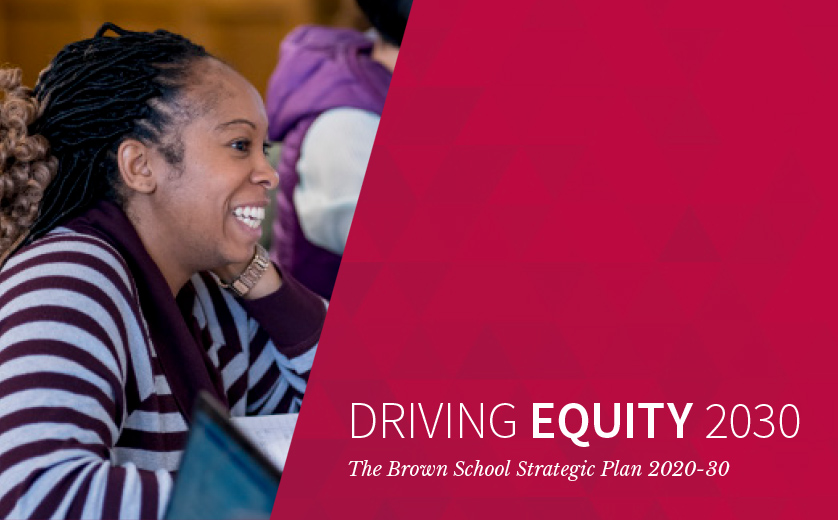Core Commitment
Equity, Diversity and Inclusion
The Brown School holds a commitment to equity, diversity and inclusion as a core value. Advancing this area is and has been a central feature of our history and mission, and we have achieved significant gains in developing a more representative community.
The centering of equity in our social work, public health and social policy research and advocacy represents an important opportunity for our institution. We now must move from aspiration to action, transforming all areas of our teaching, operations and research to ensure equity, as well as diversity and inclusion. This will require a systemic approach that identifies and eliminates internal biases, as well as a focus on capacity-building, training, collaboration and accountability measures.
Equity is realized when the outcomes of individuals, communities and populations are no longer impeded or predicted by identity, access to resources or geography. Washington University’s Academy on Diversity, Inclusion and Equity offers these considerations: Equity is an outcome. Equity is distinct from equality–equality means treating all members of the community the same. However, because of generations of unequal treatment throughout the history of our country—higher education generally, Washington University and the Brown School specifically—supporting equitable outcomes often calls for giving different supports to different groups.
Progress Reports
Progress Report 2022
The EDI committee has taken significant steps in creating the infrastructure to transform the Brown School into a more equitable organization and achieving its vision of “A better and more equitable society.” Highlights of these achievements include:
- Establishing methods and opportunities to collect relevant data and create EDI training grids
- Boosting training sessions (Faculty Training, Crossroads) in the pursuit of racial equity
- Curating and maintaining online readings, toolkits, and resources
- Piloting new anti-racism courses
Goals and Objectives
Equity Pedagogy: Our approach to equity-centered pedagogy facilitates inclusive learning experiences and equitable achievement of learners from diverse backgrounds and identities.
EDI underpins each part of the school, as well as all of the core commitments outlined in the strategic plan. This led us to identify three key goals and define objectives for each.
Goal 1: The Brown School will prioritize the collective construction and sharing of knowledge that advances equity and social justice through social work, public health, and social policy.
Objectives:
- Promote the critical analysis of past and current knowledge.
- Collaborate with community partners to amplify knowledge and movements that challenge social oppression and advance equity. Note: Alumni may be a resource with respect to Equity Assessments.
- Promote and value research that is inclusive of diverse Brown School constituents, including, but not limited to: faculty, students, staff, and community partners.
Goal 2: The Brown School community will work collaboratively to stimulate the active pursuit of new solutions for advancing equity and social justice locally, nationally, and globally.
Objectives:
- Engage in inclusive, collaborative research agendas that go beyond the root causes and consequences of systemic inequity and promote prevention, intervention and policy research.
- Translate research into evidence-based interventions that prioritize the experiences of populations who have been historically excluded from full participation in society and promote equity.
Collective Knowledge Construction: We are committed to collective knowledge construction that disrupts systemic oppression and advances equity. Community-engaged scholarship will inform new solutions for achieving social, economic, health, environmental and racial justice.
Goal 1: The Brown School will integrate equity into an evidence-based pedagogy in order to foster an inclusive learning climate and facilitate equitable learning outcomes among stakeholders with diverse identities.
Objectives:
- Design curriculum and course instruction to elevate diverse resources, authors, and experiences.
- Develop and utilize teaching methods that support inclusive and equitable learning experiences and outcomes.
- Collectively establish equity guidelines to be used in assessing existing and developing new curriculum. Note: Perhaps alumni with EDI interests and background as support/resource.
Goal 2: Will be based on Collaboration with Gephardt or Anna Gonzales and the Undergraduate Curriculum. Training from CIMER (Communication & Equity & Inclusion, as well Difficult Conversations).
Objectives:
- Embed anti-racism curriculum and equity content in field education instruction, applied practice and research.
- Strengthen curriculum and coursework to facilitate mastery in skills and competencies necessary to challenge oppression and advocate for equity. Note: Alumni may be a resource in equity assessments in this area.
- Facilitate robust skill-development in equitable community engagement practices that amplify community-driven agendas and leaders.
Policies, Programs, and Practices: We are cultivating an inclusive community where members across all identity groups participate in decisions that shape the institution and benefit from shared success. Furthermore, outcomes, as determined by individuals and communities, are no longer predicted by identity, access to resources or geography.
Goal 1: The Brown School will create an infrastructure that assesses, measures and monitors practices and policies through an equity lens.
Objectives:
- Establish standardized practices for collecting and disaggregating data by race, ethnicity, gender, disability, and other social identities.
- Develop and conduct Equity Impact Assessments for new and existing policies and practices across all departments and programs.
- Institute and track equity indicators and shared measures of success.
- Establish consistent processes for identifying and examining unintended, inequitable consequences of policies and practices.
Goal 2: The Brown School will develop infrastructure, policies and practices that embed and sustain equity in its organizational culture.
Objectives:
- Increase access to opportunity and improve equity outcomes as indicated by student admission and performance outcomes.
- Integrate consistent and inclusive hiring, retention, and career development practices* that take into account diverse representation and structural barriers associated with social identities.
- Establish fair compensation and pay equity practices that help to achieve parity for populations that have historically experienced inequitable wage gaps.
Goal 3: The Brown School will allocate resources to achieve equity & inclusion, and create accountability systems for sustaining equity.
Objectives:
- Allocate sufficient financial and human resources to stabilize and expand existing DEI structures.
